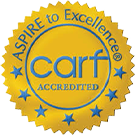People with I/DD can live meaningful, happy lives.
Terminology & Support
While a person can have both an intellectual disability and a developmental disability, there is some overlap in how the terms have commonly been used in the past. “Developmental disability” or “DD” has often been used as both an umbrella term and a more specific category of disabilities. The more concise and increasingly common “I/DD” helps to simplify this, but don’t be surprised if you still see “DD” used broadly by some organizations—it doesn’t necessarily preclude intellectual disabilities.
What is an intellectual disability (ID)?
While specific definitions can vary by state, ID is generally characterized by significant limitations in intellectual functioning (mental capacity, learning, etc.) and adaptive behaviors (conceptual, practical, and social skills typically learned from an early age).
What is a developmental disability (DD)?
Specific definitions may vary by state and may also encompass ID, though developmental disabilities also include physical disabilities present at birth or developed in childhood and social skills typically learned before the age of 22.
What support is available for individuals with I/DD?
Depending on their needs, a range of support services are available for individuals with IDD. Medicaid waivers can help address the financial components of professional I/DD services and support. Community support groups and disorder-specific organizations help keep individuals connected with their community and build important interpersonal skills. Connecting with a variety of services is hugely beneficial to both individuals and families as it allows them to “connect the dots” between financial needs, education, and the sharing of ideas within our community!


